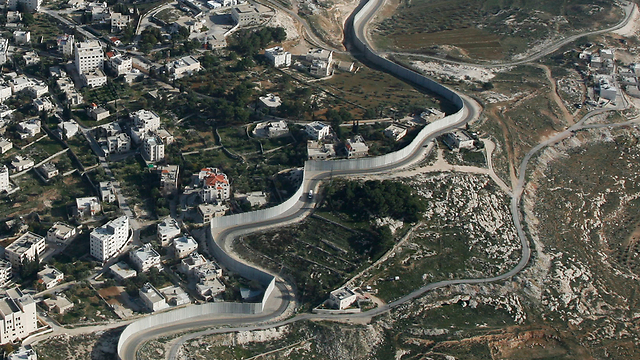As part of a proposed peace plan, Commanders for Israel’s Security has released a new report advocating a multilayered security approach that would require US forces, Palestinian security training, and Israel’s maintaining defense capabilities.
Maj. Gen. (res.) Gadi Shamni says the country should start implementing a new multi-layered security system that could help pave the way to a two-state peace deal with the Palestinians and address the fears of many Israelis.
Shamni, co-author of a new study on arrangements to provide better security for both Israelis and Palestinians, entitled “A Security System for the Two-State Solution,” said its proposals include the phased redeployment of Israeli security forces with target timetables and can create more incentives for peace.
Shamni briefed several reporters Thursday along with retired Maj. Gen. Amnon Reshef, a fabled Israeli war hero who chairs a group of more than 200 generals behind another recent report outlining a plan to improve Israel’s security.
The reports were coordinated by the nonpartisan US-based Israel Policy Forum, which advocates for a two-state solution and is campaigning in the US to promote it.

A call to the Palestinian UN Mission seeking comment on the report was not answered.
The plan by Commanders for Israel’s Security which Reshef heads calls for separation from the Palestinians and completion of the border fence in the West Bank, a freeze on settlement building, the acceptance in principle of the Arab Peace Initiative and the recognition that east Jerusalem should be part of a future Palestinian state “when established as part of a future agreement.”
The Israeli opposition and much of the international community have long argued for these proposals.
Shamni’s report says its purpose is to demonstrate that security measures “can provide Israelis and Palestinians with a degree of security equal or greater to that provided today by Israel’s deployment into the West Bank, and that such measures can be consistent with Palestinian needs for sovereignty and dignity.”
The report proposes a multi-layered security system with better relations with the Arab world including countries like Saudi Arabia as a first layer, stronger relations with Egypt and Jordan as a second layer, and a border security system on the Jordan River as a third layer.
It also calls for a non-militarized Palestinian security force, a small highly trained Palestinian counterterrorism unit, a joint Israeli-Palestinian operations center, and a long-term US commitment to the security of both countries and their neighbors.
US Col. Kris Bauman, another co-author, was chief of staff to Gen. John Allen when he was helping Secretary of State John Kerry with Israeli-Palestinian negotiations that ultimately failed. He said the proposals were designed to show that fears over security can be addressed.
“What we’re proposing here is a group of 300 to 800 Americans that would be involved in training, in equipping, and monitoring this whole arrangement, which gives Palestinian forces not just the training they need, not just the equipment they need but also kind of the backbone they need when they know somebody is watching over their shoulder,” he said.
Ilon Goldenberg, the director of Middle East security at the Center for a New American Security which produced the report, said under its proposals “Israel still retains the ability to defend itself by itself in cases of emergency.”
Shamni said Israel is “strong enough” to take the risks to implement the new security system.
If things work, there will be a greater incentive for peace, he said, “and if things collapse … it’s not an existential threat for Israel.”
As reported by Ynetnews
